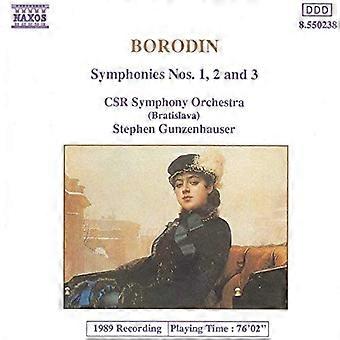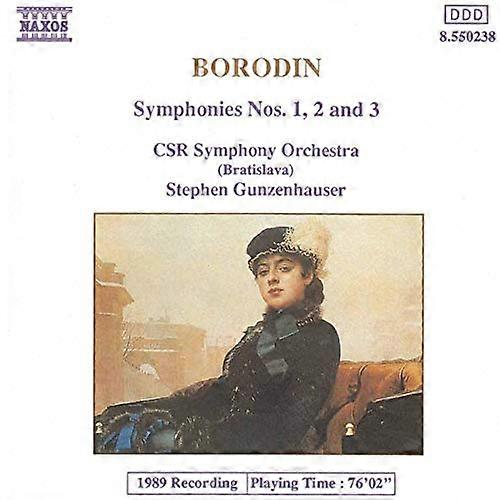Kuvaus
Alexander Porfir'yevich Borodin (1833 - 1887)Symphony No.1 in E flat major Symphony No.2 in B minor Symphony No.3 in A minor (completed & orchestrated byAlexander Glazunov)Alexander Porfir'yevich Borodin was born in 1833, theillegitimate son of a Georgian prince, assuming, according to custom the surname andpatronymic of one of his father's serfs. His mother later married a retired army doctorand he was brought up at home in cultured and privileged surroundings. Here he was able todevelop his early interests in music, in the course of a general education that won himentry in 1850 to the Medico-Surgical Academy. His public career was as a scientist, from1864 as a professor of chemistry at the Medico-Surgical Academy, and involved him inteaching and in research. In common with a number of contemporaries, he was only able toindulge his interest in music in his spare time, a fact that delayed his progress andleft, at his death in 1886, a number of incompleted projects, to be assembled and finishedby his friend Rimsky-Korsakov, who had resigned his commission in the navy to devotehimself entirely to music, and Rimsky-Korsakov&
146;s pupil Alexander Glazunov.The nineteenth century saw the development of nationalismthroughout Europe. In Russia there was an intellectual reaction to the westernizingtendencies initiated by Peter the Great a century before, and in all the arts a movetowards the creation of something specifically Russian. In music opinions were dividedbetween a group of nationalist composers, the so-called Five, led by Balakirev, who hadenjoyed a measure of professional training, and including, in addition to Borodin andRimsky-Korsakov, the expert on military fortification Cesar Cui and the alcoholic ex-armyofficer turned civil servant Mussorgsky. These nationalist composers gloried in their ownrelative amateurism, opposing strongly the establishment of professional conservatories inSt. Petersburg and Moscow by the Rubinstein brothers, whom they regarded as representativeof 'German' music. The succeeding generation was able to provide a synthesisbetween these two rival movements, joining the professional training of the conservatoriesto Russian sources of inspiration.Borodin attempted three symphonies, the last of which he neverfinished. The first, in E flat, took him five years to complete, occupying hisintermittent attention from 1862 until 1867. It was given a poor trial performance underBalakirev in March 1868, but was more successful when it was played in the first RussianMusic Society concert of 1869. Borodin had met Balakirev first in 1862 and fallen underhis influence, of which the First Symphonywas a more or less immediate result, his first sustained exercise in composition andsubjected to the often contradictory criticism of his new mentor at every step.The E flat Symphonyopens with a slow introduction that contains the germ of the Allegro first subject. An E flat major secondmovement scherzo shows a debt toMendelssohn, a favourite
-
Fruugo ID:
426567131-895659262
-
EAN:
4891030502383

